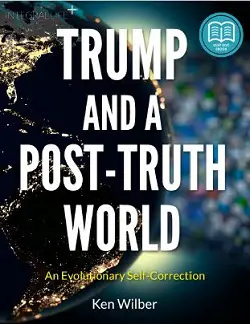|
TRANSLATE THIS ARTICLE
Integral World: Exploring Theories of Everything
An independent forum for a critical discussion of the integral philosophy of Ken Wilber
 Scott F. Parker is a writer and editor whose books include Coffee - Philosophy for Everyone: Grounds for Debate and Running After Prefontaine: A Memoir. He has contributed chapters to Ultimate Lost and Philosophy, Football and Philosophy, Alice in Wonderland and Philosophy, Golf and Philosophy, and iPod and Philosophy. He is a regular contributor to Rain Taxi Review of Books. His writing has also appeared in Philosophy Now, Sport Literate, Fiction Writers Review, Epiphany, The Ink-Filled Page, and Oregon Humanities. In 2010 he published the print edition of Jeff Meyerhoff's Bald Ambition: A Critique of Ken Wilber's Theory of Everything. For more information, visit http://scottfparker.blogspot.com. Scott F. Parker is a writer and editor whose books include Coffee - Philosophy for Everyone: Grounds for Debate and Running After Prefontaine: A Memoir. He has contributed chapters to Ultimate Lost and Philosophy, Football and Philosophy, Alice in Wonderland and Philosophy, Golf and Philosophy, and iPod and Philosophy. He is a regular contributor to Rain Taxi Review of Books. His writing has also appeared in Philosophy Now, Sport Literate, Fiction Writers Review, Epiphany, The Ink-Filled Page, and Oregon Humanities. In 2010 he published the print edition of Jeff Meyerhoff's Bald Ambition: A Critique of Ken Wilber's Theory of Everything. For more information, visit http://scottfparker.blogspot.com.
You Are What You HateWilber and a Post-Truth WorldScott F. ParkerPhilosophy always creates the world in its own image; it cannot do otherwise.
I will always love Wilber because of what he tried to do: namely, to make his ideas make sense to himself.
In my essay “The Case of Wilber,” a recasting of one of Nietzsche's books about Wagner, I wrote that “Wilber and other actors can't be left in the dark to gather a following on the internet. They must be brought to light. Exposed to the air. When they are seen in the light of day they are seen plainly. If one follows in the shadows, perhaps one does not see. If one follows in the open air . . . Trump is an educator. He teaches us that we can no longer ignore bad ideas. We must confront them.”
Wilber uses “post-truth” the way Trump uses “fake news”: unironically. These terms are ironic—of course!—but the ironies are ours, not theirs.
To be “post-truth” is to think that a person is entitled to say anything he (let us apply this pronoun where it is appropriate) likes, come what may, evidence be damned. Anyone who objects to this method is “a lowlife,” “a loser,” “a dog,” “an enemy,” “a critic.”
Try this game: read Trump and Post-Truth World substituting “Wilber” wherever you read “Trump.” If you make it to the end without crying, you win! . . . Although, come to think of it, crying would be winning too. . . .
In order to break from Wilber, one must first be with him.
In his youth, Nietzsche fell under the sway of Wagner. As he outgrew the composer, he became highly critical of him. Yet he never ceased to be influenced by him. Nor did he cease to think about him. Nor, even, did he cease to be grateful for him.
“That which does not kill me . . .”
When I first published on Wilber it was about the experience of having been among his disciples. The questions that occupied my attention were: What is it about this writer that attracts a cult? What was it about me that I wanted to belong to it? That I was able to begin writing from after the fact was due mostly to good books and good luck. Foremost, Jeff Meyerhoff's Bald Ambition finished the job of dismantling the edifice of Wilber's thought for me. I was lucky to read that book as it was published on this site. It came at a good time for me. Just a few years earlier, encountering such criticism would have led me to double down on my commitment to Wilber and to reject Meyerhoff out of hand. But by 2006 my utopian dreams for the Integral crowd had already been revealed to me as naive. And the intellectual edifice the utopian vision depended on, which Meyerhoff would dismantle for me, had already begun to show its cracks.[1] I will always love—yes, love—Wilber because he is part of me. More, I will always love Wilber because of what he tried to do: namely, to make his ideas make sense to himself (and, by extension, the rest of us). I still remember what he looks like through those eyes— 
Scott Parker, Wilber, 2004, oil on canvas,
16 in. x 12 in. (40.6 cm x 30.5 cm)
At the same time, I will always oppose Wilber because of what he did with the sense he tried to make: namely, to reify it; to squeeze this wonderful world into the tiny prison of self.
The philosopher's sin is the same as the politician's: believing his own bullshit—losing the ability to discern between what he says or thinks and what is.
According to the Mayo Clinic website, “Narcissistic personality disorder is a mental condition in which people have an inflated sense of their own importance, a deep need for excessive attention and admiration, troubled relationships, and a lack of empathy for others. But behind this mask of extreme confidence lies a fragile self-esteem that's vulnerable to the slightest criticism.”
A brief and plausible psychobiography of the principals: the unloved son is the first—but still only one—of his father's victims. We are, all of us, in this together.
Trump is indifferent between truth and lies. He speaks only in expediencies—or tries to. Wilber worships truth so faithfully he is sure he alone can be devout. Everything he says is self-serving; his tragedy is that he can't recognize this.
But just as not every politician, not every philosopher is a narcissist. Before Trump, there was Obama. After Trump, there could be— After Wilber, there could be—
This essay's epigraph, from Sue Prideaux's I Am Dynamite! A Life of Nietzsche, concerns his reading of Plato, Schopenhauer, and any other philosopher who would impose “self-tyranny upon human nature.”
Wilber opposes postmodernism because he thinks it means there is no truth and therefore no meaning. Nihilism was Nietzsche's great fear for society. What postmodernism really means is beware anyone who would save your soul, no matter how much he promises to have integrated. We are still reckoning with the nihilism Nietzsche foresaw.
Note on a new pre/trans fallacy: The way out of nihilism will be through it, not around it. It will be slow, deliberate, painful, messy, confusing, frustrating, reflective, hopeful, Obama-like. There can be no going back to authoritarians, demagogues, philosopher-kings, tough guys, Gods.
What we need now is to listen to what people are saying, to listen even to what they are not saying. It is possible to adapt rather than control; it is possible to be pragmatic rather than dogmatic; it is still possible for a philosopher to be sensitive and supple and light on her feet—
“Ken Wilber and Intellectual Humility” was my last word on Wilber. Then “The Case of Wilber” was my last word on Wilber. And now this is. NOTES[1] See the accompanying essay, “Synthesizing the Kosmos?”
|
